The Winter Olympics in Beijing were games wreathed in controversy. To many, China was a problematic host, given the country's human rights abuses and hard authoritarian turn. One of the loudest voices condemning China is not a voice at all, but rather, a hand. Since self-exiling from China in 2009, the artist known simply as Badiucao has used his work to take on the country's leader Xi Jinping, specifically, and the regime more generally. Like all the best political cartoonists, Badiucao is, alternately angry and playful as he calls attention to what he sees as China's brutality. As we first reported in December, it's come at a steep price. Badiucao may never go home again. But on he goes, traveling the world, using paint and wit – online and on walls - to draw truth to power.
Had you been in Miami Beach last fall, you'd be forgiven for walking by this plaza and thinking you'd encountered promotional billboards for the Beijing Winter Olympics. But a closer look revealed a provocative visual argument for why China was unfit to host the games. Here was a Chinese hockey player bloodying a Tibetan monk. A Chinese snowboarder atop a surveillance camera. A faceless Chinese biathlete poised to execute a member of the Uighur minority. A curler representing China's delay in warning the world about COVID. This was the handiwork of Badiucao, a 35-year-old Chinese exile, now based in Australia.
Jon Wertheim: I notice if you look closely, those aren't conventional Olympic rings…
Badiucao: They are actually made of barbed wire. That's exactly how China is going to use Olympics. Not as a celebration for humanity, but actually use it as a platform to promoting its propaganda, which is fundamentally cracking down on people's basic rights.
Badiucao had come to south Florida to accept the Human Rights Foundation's Vaclav Havel Prize for creative dissent.
Jon Wertheim: What do you see as the purpose of your art?
Badiucao: I sometimes just imagine I'm this kid who's holding a big rock and just throw the rock into the lake so that we see all the splash, we see the change.
Jon Wertheim: You throw your rock in this lake, see the splash, see where the ripples, ripple.
Badiucao: Exactly.
China does not tolerate ripples. Inside China, there are strict laws forbidding mocking and questioning leaders of the communist party, known as the CCP. Even outside China, dissent does not go over well.
Jon Wertheim: Do you feel in danger? Do you feel unsafe?
Badiucao: Well, this is actually my daily routine that I will receive death threat in a daily basis online, on my social media, Twitter, Instagram, direct message.
Badiucao knows that as an artist poking the Chinese regime, he risks retaliation, both against himself and his family back in China. For years, he hid behind a mask in public, working incognito, guerilla-style, both in Australia and any time he traveled. He adopted a pseudonym, Badiucao, a name that, purposely he says, has no meaning.
Jon Wertheim: How many people know your real name?
Badiucao: If you know I'm Badiucao, then you don't know my real name. And if you know my real name, then you don't know I'm Badiucao.
When the Chinese figured out his real identity three years ago, Badiucao initially went underground. But he took off his mask and has continued hurling darts at the regime. In one recent cartoon, tennis star Peng Shuai confronts the reality of accusing a former vice premier of sexual assault.
Badiucao: I wanna be an inspiring figure. I want my art to helping others to collecting courage and join me. But if I giving up this, then what does it say to the rest of them?
Jon Wertheim: What is the relationship between your popularity and your security?
Badiucao: I do think it has a very close relationship.
Jon Wertheim: So almost the more popular you get, you're buying yourself an extra layer of security?
Badiucao: Yeah. (laughs) And that's the only way that you can do it.
Maybe so, but being popular also means his work has been scrubbed by censors inside China.
Jon Wertheim: What is it about your work that drives this regime crazy?
Badiucao: I guess it's this attitude that I don't care about how serious you are, how dangerous you are. I'm just gonna be myself. I am an individual. I'm not controlled by any authority, certainly not CCP. That scares them. Because all they want is total control.
Jon Wertheim: It sounds like you know exactly what buttons to push, what, what levers to pull on that's gonna tweak them.
Badiucao: I guess it's not me finding the button. It's them offering the button to me. (laughs)
One example among many: an internet meme surfaced, comparing Xi Jinping and Barack Obama to Winnie-the-Pooh and Tigger. No big deal, right? China censored any mention or image linking Xi to Pooh. To Badiucao, this was irresistible. He created a series of cartoons poking fun at Xi's hardline stance against an animated Disney character.
Jon Wertheim: What was it about Winnie-the-Pooh? Why was that so effective?
Badiucao: Because Winnie-the-Pooh is so loved by the public. It's so recognized. And when it's combined with Xi Jinping's image, then you have people ask questions, 'Why do you want to delete that yellow bear?'
Jon Wertheim: You recognize the absurdity of this towering superpower being so offended by a benign yellow bear.
Badiucao: Exactly. If you are in the democratic society, I think politician will be thrilled if they can compare with Winnie the Pooh instead of some evil character. But we're talking about China.
When Xi was reelected by China's parliament the margin was 2,970 votes to zero. And when Xi got rid of term limits, allowing him to rule indefinitely, Badiucao posted a tongue-in-cheek creation online he called "Xi Forever." When the Communist Party went to work on passing a resolution favorably equating Xi to the dictator Mao Zedong, Badiucao, armed with posters, homemade glue, and a full satchel of outrage, went to work in Manhattan. He compared Xi to a magician conjuring chairman Mao's spirit.
Badiucao: Xi Jinping has tried to portray himself as another Mao Zedong, another red sun of China. He wants to achieve what Mao has achieved, he wants to be celebrated as this godlike figure like Mao enjoyed in his time.
It was by accident that Badiucao became a leading critic of the Chinese Communist Party. In 2007, he was a law student in his hometown of Shanghai, watching a film online when the movie abruptly switched to footage someone had secretly embedded, depicting the 1989 student protests in Tiananmen Square.
Badiucao: And that is actually the very first time I know this exists.
Jon Wertheim: So wait, so you're in law school, you're in your 20s…
Badiucao: I am.
Jon Wertheim: And the first time you're hearing about the Tiananmen Square Massacre, this worldwide news, and the first time you're hearing about it is when randomly it's in a documentary you happen to see?
Badiucao: Yeah. Thanks to some, you know, clever dissident who made this happen.
Jon Wertheim: Your parents hadn't told you about this?
Badiucao: Never.
Jon Wertheim: Teachers?
Badiucao: Never.
Discovering the truth about Tiananmen Square made Badiucao want to leave China. It wasn't just what had happened; it was how easily the history was erased. In 2009, he resettled to Australia, gave up law and started drawing, despite no formal training. He eventually branched out: traveling and performing street art to highlight China's repression. In these scenes from the Australian documentary "China's Artful Dissident," Badiucao, still masked, posed in front of Berlin's Brandenburg Gate. He was honoring one of the most taboo subjects in China: Tank Man, the nameless pro-democracy protester who stood in front of the Chinese military in 1989.
Badiucao: Tank Man is the ghost haunting CCP the most.
Jon Wertheim: What does Tank Man represent?
Badiucao: It shows that any ordinary people, or person, could have the courage to stand in front of the most powerful object.
Jon Wertheim: I know the image of Tank Man is always near you.
Badiucao: Before the 25th anniversary of Tiananmen Massacre, I just want something on my right arm, the arm that I use to draw, as a reminder that this ordinary Chinese guy who just collect all the courage in the world, and push himself in front of the tank. He's fearless.
While in the U.S., Badiucao connected with students who marched for democracy in Tiananmen Square. They are now middle-aged, exiled and still bear scars. Fang Zheng lost his legs to a tank during the massacre. Zhou Fengsuo was among the first to enter Tiananmen Square and one of the last to leave. The former students see Badiucao keeping alive their ideals.
Zhou Fengsuo: It's important for the next generation to carry the torch on. And I see this hope in him. And he's so creative.
Jon Wertheim: That's how you feel, he's carrying the torch for what your generation started.
Zhou Fengsuo: Yes. Definitely.
As a protest leader, Zhou became the fifth-most wanted man in China. He spent a year in jail, then fled to the U.S. in the mid-90s. Zhou says China doesn't know how to handle Badiucao.
Zhou Fengsuo: Chinese influence over the world, it's so pervasive. And they can control anything, for example, you know, U.S. companies but still they cannot change Badiucao. This one single person who can always come out with endless, arts challenging the authority.
Jon Wertheim: You're saying the Chinese Communist Party can pressure companies and other nations, but they can't…
Zhou Fengsuo: They can't change this person.
Jon Wertheim: ...pressure this guy.
Zhou Fengsuo: Yeah, that's the spirit of 'Tank Man,' the person versus totalitarian nation. He's definitely a thorn in their eye.
Badiucao may be a lone dissident, taking on the world's largest government, but he is convinced his is no exercise in futility.
Jon Wertheim: You said you admire the mythological figure, Sisyphus.
Badiucao: Right.
Jon Wertheim: What'd you mean by that?
Badiucao: His mission seems, like, doomed. That he will never push the rock to the very top of the mountain. It's a bit like me when I'm creating artworks to challenge the Chinese regime. I don't know when it will be changed. Or I don't know if my work will change it at all. But even if that is a reality, does it mean my work has no meaning? I don't think so.
In September, Badiucao brought out his paintbrush, to convey his outrage for China's crackdown on Hong Kong. Fashioning Hong Kong's leader Carrie Lam as a puppet of Xi Jinping, Badiucao melded their faces. Last November in northern Italy, a center of art, that combined image greeted visitors as Badiucao held his first major solo exhibition in the city of Brescia. It almost didn't happen. At the last minute, China tried to flex its muscle.
Badiucao: They're actually writing threatening letters. It's like a blackmailing, you know? "If you do Badiucao's show, then maybe in the future our collaboration will be problematic."
Specifically, the Chinese Embassy in Rome demanded the show be cancelled because the exhibition was "full of anti-Chinese lies," would "seriously wound the feelings of the Chinese people" and posed "a threat to friendly relations between China and Italy." The Italian authorities held firm and the show went on. There was a nod to what Badiucao sees as Xi's willfully slow response to COVID. And he paid homage to the Uighur minority that China has imprisoned.
Jon Wertheim: To what extent are you representing the people that can't express themselves inside China?
Badiucao: I think this is the reality that Chinese people do not have a sense of safety that they can speak freely. But I am in this very privileged position that I'm not in China. So I have every responsibility to make my voice to be heard, to become their voices.
Produced by Draggan Mihailovich and Jacqueline Williams. Broadcast associate, Elizabeth Germino. Edited by Daniel J. Glucksman.
"artist" - Google News
August 01, 2022 at 06:02AM
https://ift.tt/PujBeta
Chinese artist Badiucao: Drawing truth to power - 60 Minutes - CBS News
"artist" - Google News
https://ift.tt/zmLRCPJ
Bagikan Berita Ini
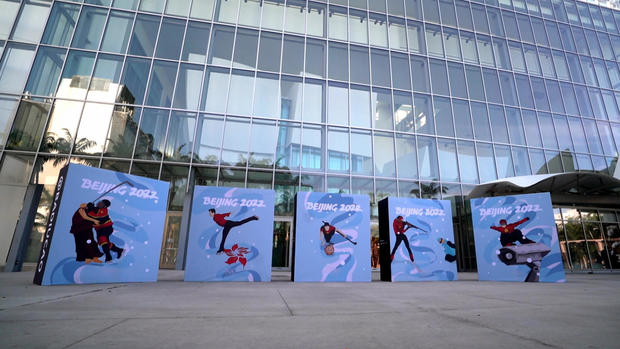
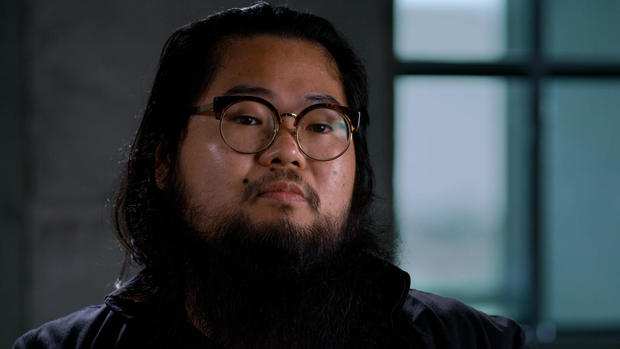
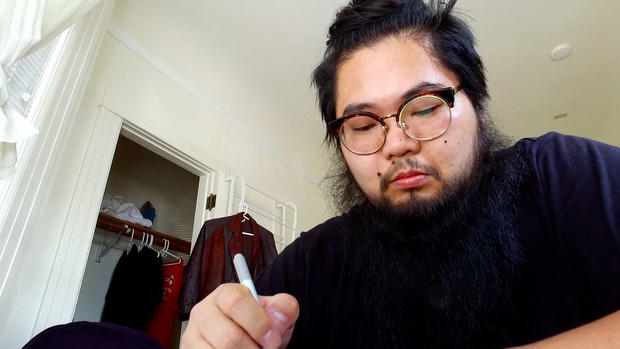
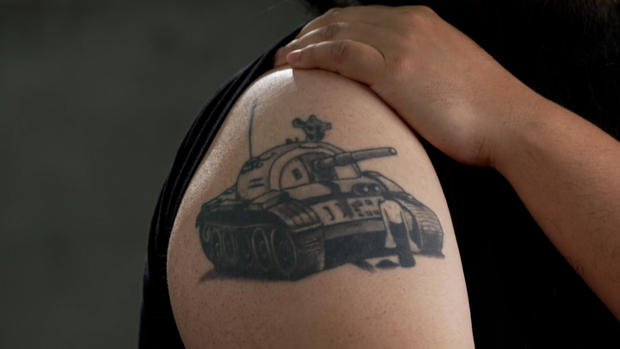

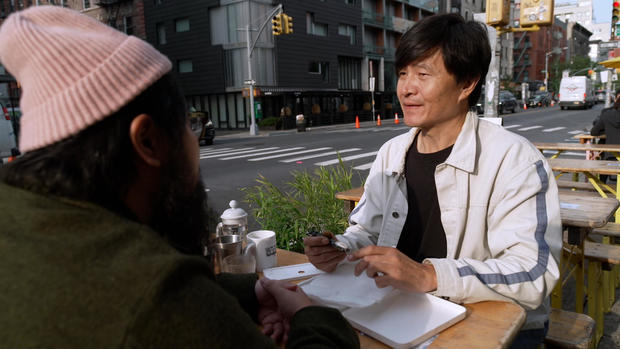














0 Response to "Chinese artist Badiucao: Drawing truth to power - 60 Minutes - CBS News"
Post a Comment